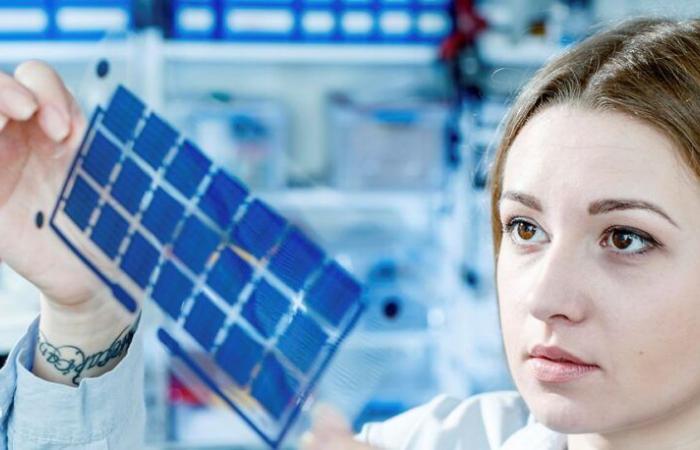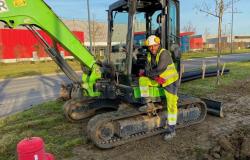
Faced with climate disruption, Germany and France are accelerating their scientific cooperation on energy. They have just launched projects in two key areas: batteries and hydrogen. Enough to boost Europe’s technological sovereignty.
Floods in Spain and Germany, heat waves in Africa, floods in southern Brazil, drought in the Amazon, disasters caused by global warming are increasing. 2023 was the hottest year on record, says the World Meteorological Organization. And 2024 has just succeeded it. Faced with this challenge, Germany and France are joining forces to accelerate progress towards a carbon-free future.
The two countries have developed a joint initiative to accelerate innovation on two key technologies: batteries and hydrogen. At the end of November, in Paris and Berlin, they gave the official start to concrete research programs.
High-performance solid-state batteries made in Europe
The Franco-German research project on HIPOBAT batteries (for “High Power Batteries”) was launched at the Collège de France and at the residence of the German ambassador, in Paris, on November 26 and 27. The ambassador, Stephan Steinlein, invited scientific, economic and political figures to debate the role of batteries in the context of climate change and decarbonization as part of a “Climate Talk”.
Scientists and representatives of the two Ministries of Research (MESR and BMBF), presented the HIPOBAT project, which aims to develop innovative high-power batteries, combining a long lifespan and high energy density thanks to new models. solid batteries. Such batteries are likely to reduce ecological, geopolitical and economic pressure in terms of electrochemical energy storage.
Research will focus on the speed of diffusion of ions and electrons during charging and discharging, as well as on the thermal management of cells. They aim to pave the way for the targeted design of high-performance solid-state lithium and sodium batteries. And this, thanks to new materials, new cell designs, a better understanding of possible aging phenomena, as well as advanced characterization and modeling work.
The HIPOBAT project intends to strengthen the technological sovereignty of France, Germany and the European Union in a key area for the energy transition. It is financed by the two countries to the tune of 17.3 million euros. It mobilizes for three years (2024-2027) some 90 German and French researchers from twelve renowned universities and research centers (six from each country). Their complementary skills will be articulated in six areas of work. An industrial council, made up of representatives of ten companies in the battery sector in France and Germany, supports their work.
Joining forces for a carbon-free future
France and Germany want to expand their scientific cooperation on energy. They made this known in a statement in January 2023. On May 22, 2024, during a seminar in Paris, they then announced the HIPOBAT project and a joint program in the field of hydrogen. They are now implementing these projects.
Franco-German projects for the sustainable hydrogen sector
In the field of hydrogen, a joint call for projects was launched in the spring. Entitled “Development of the hydrogen sector for the future energy mix”, it was aimed at projects carried out by at least one partner from each country. These projects were to take place over three years, for a budget of between 1.5 and 2.5 million euros (a total of 10 million euros for the five selected projects).
The objective: to boost the innovation chain across the entire sector, from research laboratories to industry and applications for the final consumer, with a view to building a sustainable hydrogen economy integrating many sectors in France, Germany and Europe. At the same time, it is a question of exploiting the complementarity of projects and national policies in the field of decarbonized hydrogen.
The call quickly bore fruit: 35 projects were submitted. A large number of them came from partners in the business world. A success beyond expectations.
The program was launched on November 29, at the French Embassy in Berlin. The funded projects, announced in October, cover the entire range of thematic priorities retained: innovations for the production of hydrogen by electrochemical means, the chemical storage or in liquid form of the hydrogen vector, as well as the integration of hydrogen in energy systems.
Two of them aim to develop new generation water electrolysis, one using fluorine-free electrolysis technology, the other to develop innovative materials for AEM (Anion Exchange Membrane) systems. . These systems are used to produce carbon-free hydrogen. They have an important role to play because they use few precious metals.
A third project targets hydrogen transport and energy storage. It intends to develop solutions by developing the production of hydrogen by decomposition of ammonia.
Major projects have also been launched in the field of energy systems. They aim to promote the development of infrastructure and the rise of technologies. They are interested in the deployment trajectories of hydrogen infrastructure, the development of synergies between French and German energy systems, as well as the modeling of infrastructure development and commercial expansion strategies in the hydrogen sector. decarbonized.
All these projects benefit from excellent cooperation between the French and German teams. They carry the promise of major innovations for both countries in a key area, both from a scientific and industrial point of view.
Anne Lefebvre (with: German Embassy in Paris, BMBF, French Embassy in Berlin)





